Not everyone wants to lose weight, and for various potential reasons, some people wish to do the opposite: gain weight.
In its most basic state, gaining weight is simply a matter of eating more food and consuming more energy than we need.
However, there is a right way and a wrong way to achieve this. Gorging on fried chicken may support weight gain, but it does not aid our overall health.
This article provides a list of 20 high-calorie foods, and they all contain beneficial nutrients too.
1) Cheddar Cheese
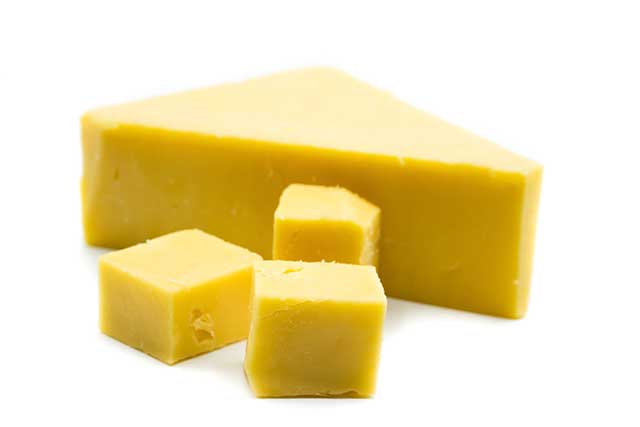
Cheddar is one of the most popular types of cheese, and it is full of essential vitamins and minerals.
In addition to calcium, Cheddar also provides an excellent source of B vitamins, phosphorus, selenium, zinc, and protein (1).
Cheddar cheese is also very energy-dense and provides 403 calories per 100 grams.
Cheese improves the taste of most dishes, and it is easy to add grated Cheddar to anything.
| 100 Grams of Cheddar | 403 calories |
| 2 oz (56 g) portion | 226 calories |
2) Chicken Thigh (With Skin)
Chicken can be rather bland, or it can taste delicious.
The difference primarily lies in the fat content of the meat, and a skin-on chicken thigh is one of the best-tasting cuts of chicken you can buy.
Since typical chicken thighs contain more than 15 grams of fat per 100 grams, they are a high-calorie poultry option.
Chicken thighs are far more than just fat and calories, though, and they provide an excellent source of B vitamins, selenium, and zinc (2).
| 100 Grams of Chicken Thigh | 247 calories |
| Per 3-Thigh Serving | 459 calories |
3) Mackerel
Mackerel is full of healthy fat, and it offers a substantial source of energy too.
On the positive side, much of the fatty acids mackerel contains is omega-3 fatty acids.
These fats are associated with an assortment of health benefits.
For example, research demonstrates that higher blood levels of omega-3 reduce all-cause mortality and improve markers of cardiovascular risk (3, 4).
That said, omega-3 isn’t the only positive contribution mackerel makes to our health. This nutritious fish also provides substantial amounts of protein, selenium, and vitamin B12 (5).
| 100 Grams of Mackerel | 262 calories |
| Per 6-oz (170-gram) Serving | 438 calories |
4) Avocado
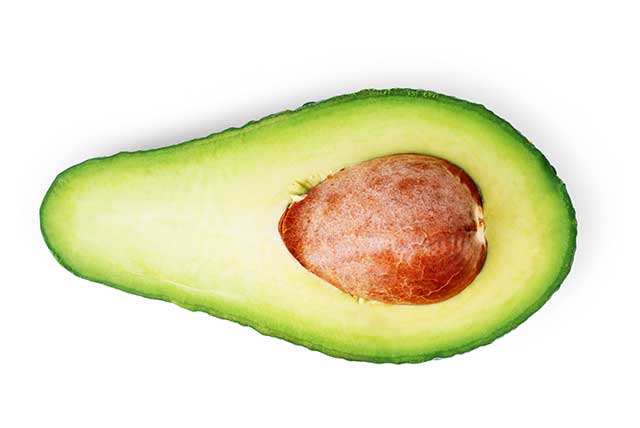
Most fruit is relatively low in calories calories.
However, there are several exceptions to this, and avocado is one of the most notable.
In addition to (fibrous) carbohydrate, avocados also supply a wealth of monounsaturated fat, and a small amount of protein.
As a result, avocados are the highest-calorie fruits available.
This little green fruit also supports our health by supplying a wide range of essential vitamins and minerals (6).
| 100 Grams of Avocado | 160 calories |
| Per Avocado | 322 calories |
5) Heavy Cream
The classic combination of coffee and heavy cream is a tasty option, and it helps to add some extra calories too.
Although it is mainly a source of concentrated fat, heavy cream still manages to provide a fair amount of nutrients.
Among these nutrients, heavy cream provides low to moderate amounts of calcium and vitamins A and D (7).
| 100 Grams of Heavy Cream | 345 calories |
| Per 2-tablespoon Serving | 104 calories |
6) Sweet Potatoes
Sweet potatoes are a calorie-dense source of energy, and they provide some useful nutrients too.
Most notably, sweet potato contains large amounts of carotenoids, which can convert to vitamin A within the body (8).
Additionally, this root tuber also provides a respectable amount of vitamin C and manganese.
Adding a few sweet potatoes to a meal is an easy way to increase the overall energy intake.
| 100 Grams of Sweet Potatoes | 90 calories |
| Regular 180-Gram Sweet Potato | 162 calories |
7) Pork Belly
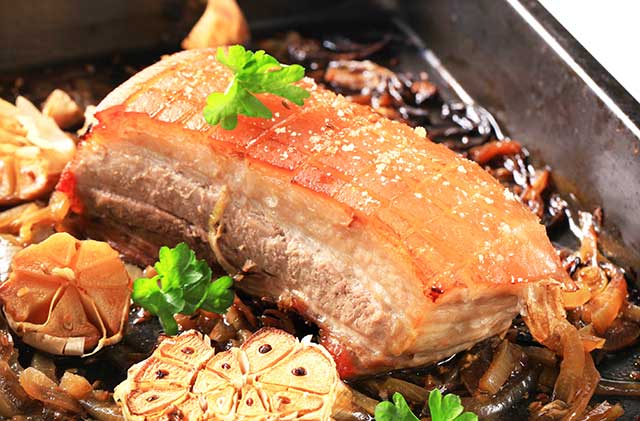
Pork belly is an extremely fatty cut of meat that is popular around the world.
Pork belly is also the major ingredient in American bacon and Italian pancetta, which is a salt-cured cold cut of meat.
Since pork belly is approximately 42% fat by weight, it offers a significant number of calories.
However, as with all meat, pork belly is fairly nutrient-dense, and it is not just about fat and calories.
Nutritionally, pork belly is an excellent source of B vitamins, phosphorus, selenium, and zinc (9).
| 100 Grams of Pork Belly | 541 calories |
| Per 6 oz (170-gram) Serving | 906 calories |
8) Macadamia Nuts
Macadamia nuts: these small nuts are surprisingly high in both fat and overall calories.
For instance, with 718 calories per 100 grams, macadamias offer more calories per gram than almost any other whole food (10).
Most of this fat comes from oleic acid, a monounsaturated fatty acid also found in olive oil.
Aside from their fat content, macadamia nuts offer a good source of magnesium, copper, manganese, and vitamin B1.
| 100 Grams of Macadamia Nuts | 718 calories |
| 1 oz (28-gram) Serving | 201 calories |
9) Pecans
Similar to macadamia (and all) nuts, pecans are a highly concentrated source of calories, and they’re fairly nutritious too.
Pecans offer a large amount of magnesium, manganese, copper, phosphorus, zinc, and B vitamins (11).
Additionally, pecan nuts are one of the most significant sources of polyphenols in the world, specifically epigallocatechin (EGCG). This phenolic compound is also thought to be the primary compound responsible for many of green tea’s beneficial effects (12).
Other than this, pecans also supply a moderate amount of protein.
| 100 Grams of Pecans | 692 calories |
| 1 oz (28-gram) Serving | 193 calories |
10) Dark Chocolate
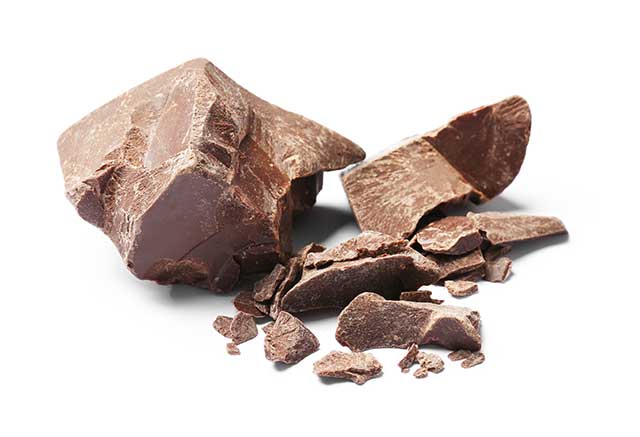
Dark chocolate is an energy-rich and nutrient-dense food choice.
Not many people realize that dark chocolate (and cocoa) is a relatively nutritious food, but it is loaded with magnesium, copper, iron, and manganese (13).
Furthermore, cocoa contains some interesting polyphenols, and human clinical trials demonstrate that they may potentially help to lower blood pressure and levels of oxidative damage (14, 15).
| 100 Grams of Dark Chocolate | 599 calories |
| 1 oz (28-gram) Serving | 168 calories |
11) Extra Virgin Olive Oil
Extra virgin olive oil is possibly the healthiest common fat available.
This fruit oil works well drizzled over cold dishes, and it offer higher oxidative stability at cooking temperatures than some people realize.
In recent laboratory trials, extra virgin olive oil outperformed most other plant oils with its high-heat stability, offering similar performance to coconut oil (16).
As olive oil is a concentrated source of fat, it contains a substantial number of calories, with just a tablespoon containing well over 100 calories.
| 100 Grams of Olive Oil | 884 calories |
| Per Tablespoon Serving | 119 calories |
12) Peanut Butter
As previously discussed, all nuts offer a substantial number of calories.
However, peanut butter takes it one step further by disguising just how much we are consuming.
Perhaps surprisingly, it takes more than 540 peanuts to make a standard 12-ounce (340-gram) jar of peanut butter (17).
As well as being high in both fat and calories, peanut butter also offers an impressive range of nutrients, including large amounts of manganese and vitamin E (18).
Lastly, peanut butter is delicious.
| 100 Grams of Pecans | 588 calories |
| Per 2-tablespoon Serving | 188 calories |
13) Rib-eye Steak
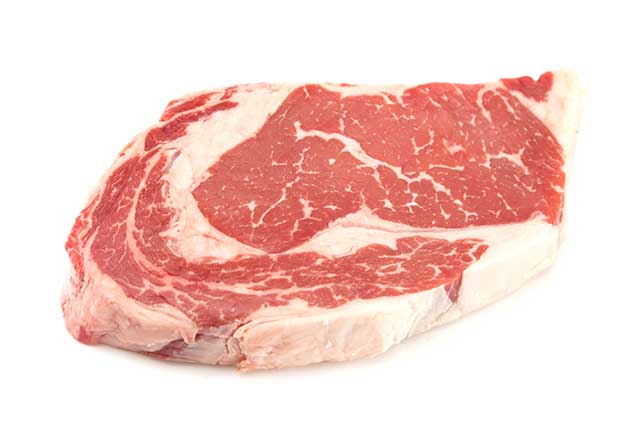
Rib-eye is one of the most popular—and fattiest—cuts of steak available.
Since rib-eye is so rich in fat, it also packs a large number of calories into one steak.
Once again, high-calorie foods tend to be delicious, and rib-eye is no exception.
Furthermore, because rib-eye steaks are generally quite large, a single steak offers close to 1000 calories.
Rib-eye steak is also reasonably nutritious, and it offers a good range of B vitamins, iron, and protein (19).
| 100 Grams of Rib-eye Steak | 291 calories |
| Per 291g Rib-eye Steak | 847 calories |
14) Lamb Chops
Arguably just as delicious as rib-eye steak, lamb chops are another rich source of calories.
Lamb is also one of the most nutritious types of meat we can eat, and thanks to the lamb’s grazing on pasture, lamb is full of essential nutrients.
In particular, lamb is an excellent source of B vitamins, zinc, protein, and it even offers 175 mg of omega-3 per 100 grams (20).
Lamb chops are relatively dense in fat, so the meat offers a fairly high-calorie content.
| 100 Grams of Lamb Chop | 235 calories |
| Per 5-oz (140-gram) Lamb Chop | 329 calories |
15) Sour Cream
Sour cream is another high-fat dairy food that offers beneficial nutrients.
This fermented dairy product contains a good range of vitamins and minerals, although only calcium and phosphorus are present in more substantial amounts (21).
Additionally, as a Lactobabillus-fermented product, sour cream should contain some probiotics.
Systematic reviews suggest that probiotics may have various benefits for the health of our gut microbiome (22).
| 100 Grams of Sour Cream | 194 calories |
| Per cup Sour Cream | 444 calories |
16) Potatoes
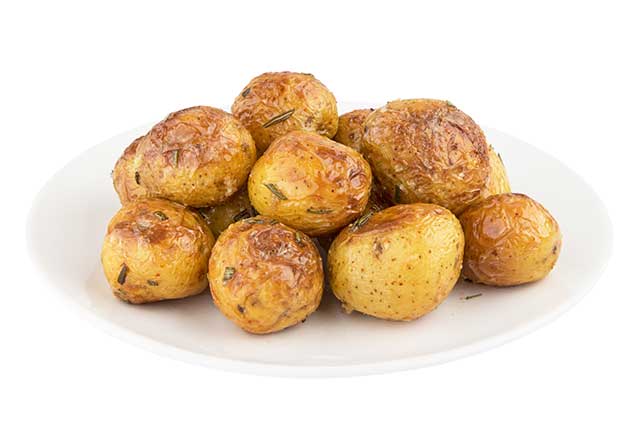
Potatoes (paired with oil) are likely responsible for a significant amount of unwanted weight gain around the world; potato chips, fries, crisps, and the list goes on.
However, health-wise, there is a big difference between regular potatoes and deep-fried potato products.
For those seeking to gain weight, adding a few regular potatoes into the diet can be a healthy way to do so.
Potatoes also contain some valuable nutrients, and a large potato supplies a good amount of potassium and vitamin B6 (23).
Since potatoes are fairly carbohydrate and calorie-rich, adding several to a meal can quickly increase total energy intake.
| 100 Grams of Potatoes | 86 calories |
| One Large Potato | 258 calories |
17) Whole Milk
Whole milk is a good source of a variety of nutrients, particularly calcium.
The calories in full-fat milk add up when drinking a glass or two, so it is an easy way to increase energy intake.
Aside from the calories and calcium, milk is also a good source of protein, offering around eight grams of protein per cup (24).
| 100 Grams of Milk | 60 calories |
| Per Cup of Milk | 146 calories |
18) Durian
Avocados are not the only high-fat fruit around, and durians are a tropical fruit that offers large amounts of fat and carbohydrate.
Durian fruit is notorious for its pungent smell, which puts a lot of people off. However, people generally like the taste of the fruit.
Although finding fresh durian can be difficult, it is usually possible to find a frozen version in a local store (or online).
In addition to its calorie-density, durian also supplies a moderate amount of B vitamins, vitamin C, and several other nutrients in smaller amounts (25).
| 100 Grams of Durian | 147 calories |
| One Cup (243-gram) | 357 calories |
19) Herring
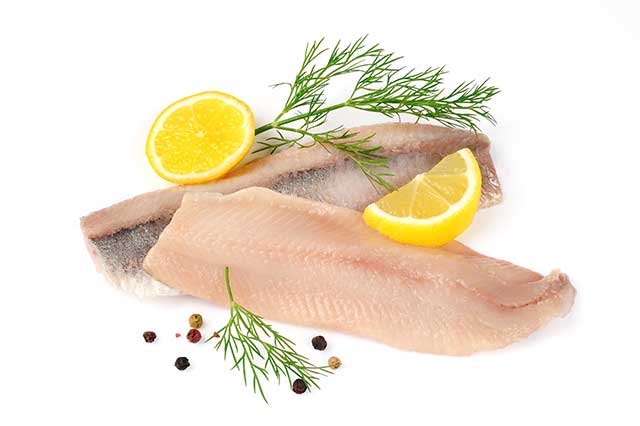
Herring is a substantial source of omega-3 fatty acids.
Furthermore, herring is packed with nutritional value, and it provides large concentrations of B vitamins, selenium, and dietary protein (26).
As well as being one of the best sources of omega-3, herring has one of the very lowest levels of mercury among all fish (27).
Opting for herring rather than a lean white fish can double the calorie content.
| 100 Grams of Herring | 203 calories |
| One Herring Fillet | 290 calories |
20) Salmon
Salmon is perhaps the tastiest commonly available fish, and it offers an incredibly healthy mix of protein, omega-3 fats, and a wide range of nutrients (28).
To increase the calorie content of a meal, try serving salmon with a creamy Cheddar cheese sauce.
Similar to herring, salmon is also very high in omega-3 but low in mercury.
| 100 Grams of Salmon | 206 calories |
| Half a Salmon Fillet | 367 calories |
Final Thoughts
There are many reasons why someone may wish to gain weight.
It could be someone wanting to bulk up and gain muscle, put weight back on after an injury, or even to gain weight under doctor’s orders.
By implementing some of the foods in this list, we can quickly increase the total amount of calories we consume.

How do some of these foods fit with a Ketogenic diet? I have a hard tome maintaining enough weight to be able to donate blood regularly. But I do not want to ingest too many carbs in the process. Thank you for including carb levels in each of these foods.
All of these foods fit with a ketogenic diet except for sweet potatoes, potatoes, and durian.
Whole milk, peanut butter, and dark chocolate can fit into a ketogenic diet if you go easy on them (relatively small portions).
Other than that, the other foods are all fine.
Thanks. I’m on Ketogenic and have lost some weight and had fun doing it. Now I want to add more muscle. I will probably try all these except the potatoes and maybe durian since I’ve never heard nor seen it.
No problem. For gaining weight and muscle, including more of the protein-rich options is a good way to go.
Thank you, as I want healthy food and gain weight as well.
very important for me.
Norma
No problem, Norma.
Hope you enjoy eating a bit more!